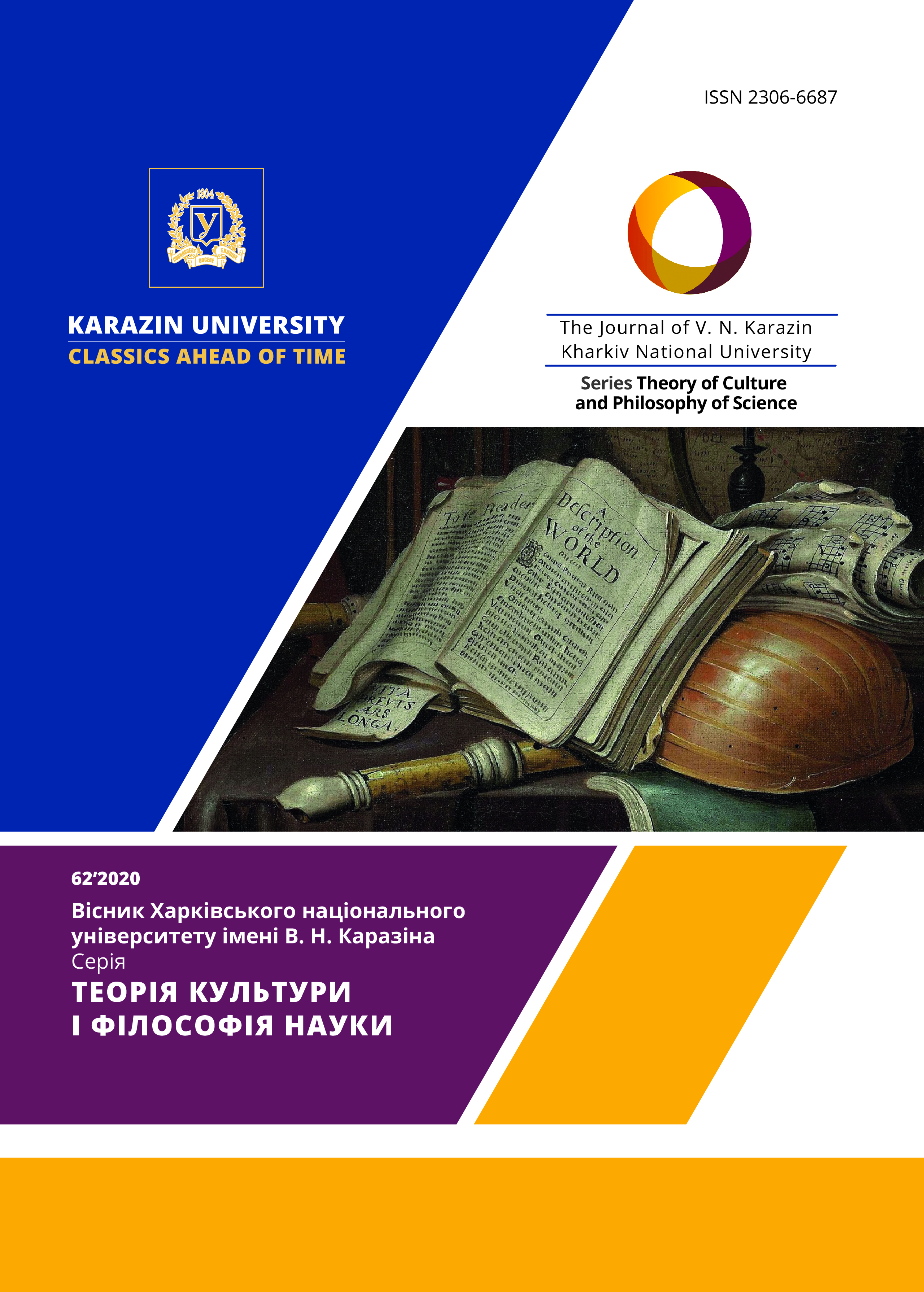ТЕАТР ЯК АНТРОПОЛОГІЧНА МОДЕЛЬ «ДЗЕРКАЛА ЖИТТЯ» ТА ВИХОВНА СТРАТЕГІЯ ГРИ У ФІЛОСОФІЇ Ф. ШИЛЛЕРА
Анотація
Стаття досліджує театр як антропологічну модель у філософії Ф. Шиллера. Метою статті є розгляд театру, його виховних функцій у філософії Ф. Шиллера. Також завданнями дослідження є аналіз просвітницької моделі театру як «дзеркала суспільного життя» та відображення цієї моделі у творчості Ф. Шиллера, її антропоцентричність, також досліджується театральна гра як виховна стратегія із трансформації людини і людства, значення театрального мистецтва як ефективного інструментарію впливу на масову культуру. Наукова новизна. Тваринна (фізична) і духовна природа людини перебувають у тісному взаємозв’язку і без цього фізіологічного та розумового зв’язку людське життя було б неможливим (ранні роботи Ф. Шиллера). Завершенням естетичних пошуків Шиллера стає його філософія театру. Для розуміння такого нового етапу розвитку театру Ерика Фішер-Ліхте пропонує поняття «філософського театру». Ми доводимо, що таке поняття пов’язано більше з театральною практикою, тому у нашій роботі щодо філософії Шиллера та його теоретичного спадку можна вживати два поняття – і «філософію театру», і «філософський театр». Одночасно ми звертаємо більше уваги на антропологічні наслідки філософських та естетичних пошуків Шиллера. Поняття краси і звернення до високого мистецтва є центром філософії Шиллера, тому що, як він вважав, без цих складових не можна сформувати доброчесної і щасливої людини. Краса (театральна форма, спектакль) з’єднує почуття і розум – може стати засобом для людини перейти від матерії до форми, від відчуттів до законів, від обмеженого до безумовного буття. У нашій роботі ми виділили та проаналізували виховні функції театру у філософії Ф. Шиллера. Як один з представників німецького просвітництва та ідеалізму Ф. Шиллер пропонує просвітницьку модель театру як «дзеркала суспільного життя», способу виховання людства та виправлення його помилок. Ця модель антропоцентрична, оскільки передбачає певне ототожнення художньої форми та самої людини через живий образ. Найкращим способом формотворення таких живих образів виступає театральне мистецтво, оскільки задіює свободне ігрове начало людини, тим самим виступаючи не тільки засобом впливу (моральної дидактики), але й організації суспільства (державний, національний театр), особливо в критичних ситуаціях соціально-культурного розвитку. Театр Ф. Шиллера став філософською відповіддю на Французьку революцію, тобто засобом реформування суспільства та людини без насильства через мистецьку трансформацію.
Завантаження
Посилання
Boal`, A. (2016). Games for actors and [non] actors. (A. Gladka, J. Salakhova, A. Chornous, B. Dedushkina, O. Potapova, Trans.) Kyiv: GO «Teatr dlya dialogu», 264. (In Ukrainian). [Electronic resource]. URL: https://drive.google.com/file/d/0B5J9gppd145NbHlSU3VQUktBQU0/view
Gumbreht, H..U. (2020). Production of Presence: What Meaning Cannot Convey. (I. Ivashchenko, Trans.). Kharkiv: IST Publising. 186. (Original work published 2004). (In Ukrainian).
Debor, Gi. (1999). The Society of the spectacle. (S. Ofertas&M. Yakubovych, Trans.). Moscow: Logos, 224. (Original work published 1967). (In Russian).
Lanshtejn, P. (1984). The life of Schiller. Moscow: Raduga, 1984.408. (Original work published 1981). (In Russian).
Sartr (2002). Philosophical encyclopedic dictionary. NAS of Ukraine, GS Skovoroda Institute of Philosophy. Kyiv: Abrys, pp. 565-566. (In Ukrainian).
Sartr. Zh.-P. (1999). Nausea. The wall. Novel. Short stories. Kharkov: Folyo, pp. 217 – 239. (Original work published 1939). (In Russian).
Safransky, R. (2007). Schiller, or the Discovery of German idealism. (A. Gugnin, Trans.). Moscow: Tekst, 2007. 557. (Original work published 2004). (In Russian).
Shyller, F. (1957). Aphorisms and excerpts from the manuscript heritage of Schiller / Shyller F. Works in 7 volumes. Moscow: Gos. yzd. xudozhestv. lyt. – State Publishing House for literary works, V.6, pp. 65–69. (In Russian).
Shyller, F. (1957). On modern German theater / Shyller F. Works in 7 volumes. Moscow: Gos. yzd. xudozhestv. lyt. – State Publishing House for literary works, V.6, pp. 7–24. (In Russian).
Shyller, F. P. (1955). Friedrich Schiller. Life and creativity. Moscow: Xudozh. lyter., 431. (Original work published 1955). (In Russian).
Shyller, F. (1957). Letters on the aesthetic education of man / Shyller F. Works in 7 volumes. Moscow: Gos. yzd. xudozhestv. lyt. – State Publishing House for literary works, V.6, pp. 251–358. (In Russian).
Shyller, F. (1957). Theater, considered as a moral institution / Shyller F. Works in 7 volumes. Moscow: Gos. yzd. xudozhestv. lyt. – State Publishing House for literary works, V.6, pp.15–24. (In Russian).
Dalaqua G. H. Aesthetic injustice. Journal of aesthetics and culture. 2020, Vol. 12. Рр.1-2, [Electronic resource]. URL: https://doi.org/10.1080/20004214.2020.1712183 (In English).
Fischer-Lichte E. Philosophical Theatre: Some Reflection on the Concept. Anglia. 2018. Vol. 136. Issue 1. Pp.43-60. [Electronic resource]. URL: https://doi.org/10.1515/ang-2018-0008, www.degruyter.com (In English).




